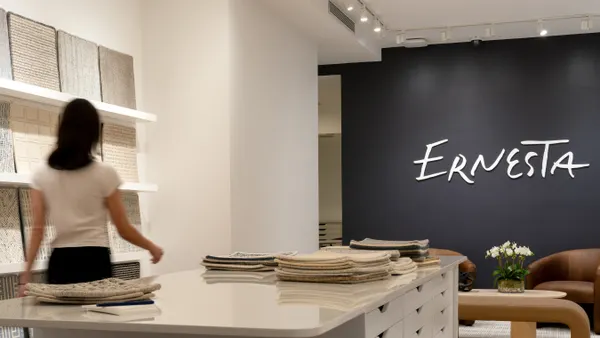Dive Brief:
-
Amazon continued its private label push and home decor merchandising with two new brands — "Ravenna Home" (launched Monday) and "Now House by Jonathan Adler" (launched Oct. 18). Amazon didn't immediately return Retail Dive's request for more information.
-
Ravenna is positioned as "classic style" at "great value," TJI Research founder Justin Smith said in a blog post, noting that Ravenna sofas are priced between $799 and $849.
-
The collaboration with designer Jonathan Adler, meanwhile, takes a page from Target's merchandising approach, with 135 home goods items like vases and lamps as well as some furniture like sofas and side tables, Smith said in another blog post.
Dive Insight:
About a year ago, Amazon joined Walmart and Target in developing new private label and exclusive furniture lines, which all in turn challenge both online upstart Wayfair and established banners like William-Sonoma's Pottery Barn and West Elm. Like Amazon's first two lines — the mid-century Rivet and farmhouse style Stone & Beam — Ravenna offers free shipping and free returns for 30 days. While Stone & Beam carries a three-year warranty, Ravenna and Rivet each offer just one year.
If Amazon is positioning Ravenna as a value line, however, its prices don't beat the likes of Target's private labels, which include Project 62 and Threshold, or Walmart's exclusive lines, Mainstays, Better Homes and Gardens and Pioneer Woman.
Recent tariffs on goods made in China could interfere with some of the price competition depending on where merchandise is sourced, according to a recent report from Coresight Research. "The household furniture market in the [U.S.] is highly fragmented, which may encourage consumers to switch away from companies that choose to increase prices in response to tariffs because they have high exposure to China," the report noted. "If such companies hike prices to transfer their increased costs to shoppers, they risk losing market share to competitors that are less dependent on China."
Those that do source from China won't find it as easy as apparel makers do to pivot from that manufacturing base, Coresight also said. The firm, citing research from CSIL, noted that China accounted for 40% of the global furniture market in 2016, which in turn "implies that furniture sellers are likely to be forced to pass on cost increases to consumers."
That could boost companies like startup Joybird, recently acquired by La-Z-Boy Inc., which manufactures its custom, mid-century modern upholstered furniture in Tijuana, Mexico.















